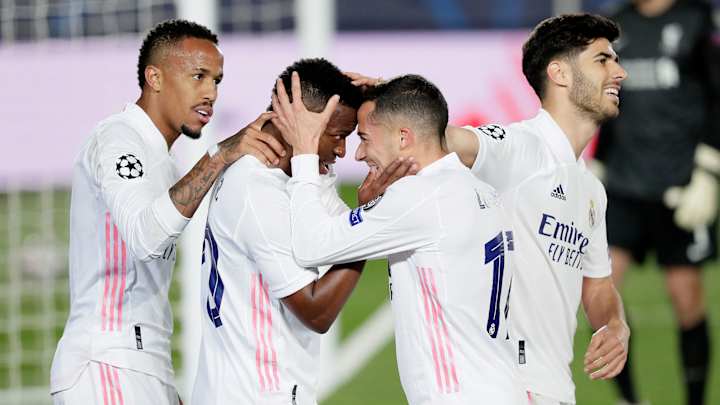Real Madrid Follows Its Tested Champions League Pattern

For both Real Madrid and Liverpool, the Champions League has offered the possibility of redemption after difficult, substandard seasons. As it has turned out, Real Madrid may somehow win La Liga after all, and it now has a clear advantage after the first leg of the Champions League quarterfinals, which doubles as a repeat of the 2018 final. A 3–1 scoreline may not quite be decisive, and Mohamed Salah’s away goal can be the source of some hope for Liverpool to take into next week's second leg, but Madrid looked by far the better side in Tuesday's clash in the Spanish capital.
For Madrid, the pattern has become very familiar: a scratchy group phase, followed by a slow acceleration through the knockouts as the midfield three of battle-tested veterans Toni Kroos, Luka Modrić and Casemiro find their rhythm. It’s been enough to win three Champions League titles under Zinedine Zidane, and, with Madrid in the more open half of the bracket after the last draw, it could be enough to reach yet another final.
Given how sluggish La Liga sides have looked against high-class opposition this season, and given how rattled Madrid was by Manchester City’s press last season, the thought had been that the Spanish champion might be vulnerable. As it turned out, Liverpool couldn’t lay a glove on Madrid before halftime but instead found itself pinned back in its own half, defending desperately.
This is not the Liverpool of the last two seasons. Injuries have hammered cohesion, particularly at center back, where it has used 18 different combinations this season. A pairing of Nat Phillips and Ozan Kabak is nobody’s idea of an elite one. When given a foothold, Liverpool still has the firepower to trouble sides, as it showed against a poor Arsenal on Sunday, but Tuesday it never got into the game until it was 2–0. It was too slow in possession and was never able to press, and the result was that the front three were barely involved.
Jürgen Klopp pulled a major surprise by leaving out Thiago Alcântara for Naby Keïta, but if the intention was that his running power would trouble Madrid, it was badly misplaced. Keïta gave the ball away again and again, while Kroos in particular had one of those unflustered games in which he dominates midfield without ever seeing to break into a sweat. It was his long passes that led to both goals before halftime, while Keïta was withdrawn for Thiago three minutes before the break
First, Kroos picked out Vinicius Junior with a 50-yard pass. Moving from left to right, Vinicius ran between Trent Alexander-Arnold and Phillips, took the ball on his chest and finished with great fluency.
GOAL REAL MADRID! Vinicius Junior takes down Toni Kroos's long ball perfectly and beats Alisson for the opener. 1-0 #UCL pic.twitter.com/wvAaFfNgX4
— SI Soccer (@si_soccer) April 6, 2021
The second was a long diagonal that Alexander-Arnold headed into the path of Marco Asensio, who knocked the ball over Alisson and then nudged into the empty net. Liverpool was furious that Lucas Vasquez had gotten away with a barge on Sadio Mané in the build-up, but that incident was 27 seconds before the goal and in a different phase of play. It should have been given as a free kick, but was too distant from the goal for VAR to intervene.
That's two for Real Madrid! Marco Asensio puts the finishing touches on the second after Trent Alexander-Arnold's gaffe #UCL
— SI Soccer (@si_soccer) April 6, 2021
(via @TUDNUSA) pic.twitter.com/CxMUCKi2wK
There has been a lot of debate about Alexander-Arnold’s omission from Gareth Southgate’s last England squad, and this seemed like a game almost designed to explain his reservations about the right back. Going forward Alexander-Arnold remains a fine fullback, his poor form in the first half of this season notwithstanding, and he is one of the best crossers in the Premier League. But when Liverpool is on the back foot, when his forward runs are restricted, he is not a great defensive fullback and was badly exposed at times.
But the second half had a very different dynamic. Liverpool was able to get higher up the pitch, and as soon as it applied pressure to the Madrid rearguard, the home side looked shaky. After a first half in which Madrid was almost entirely dominant, Liverpool scored an away goal six minutes into the second, with Salah converting Gini Wijnaldum’s stabbed through ball.
Mohamed Salah pulls one back for Liverpool! An away goal changes everything after a dreadful first half for LFC #UCL
— SI Soccer (@si_soccer) April 6, 2021
(via @TUDNUSA) pic.twitter.com/mHy9ehxArl
This Liverpool, though, is fundamentally not good enough at the back. Although the second half was end-to-end, the vital fourth goal went to Madrid. It was largely down to Liverpool’s sloppiness in defending a throw-in, with Modrić darting unchallenged into the box and feeding Vinicius to squeeze his second (and only his fourth ever in the Champions League) past Alisson.
Liverpool has come back from worse deficits than this against a Spanish side in the knockout stage of the Champions League, but there are big differences between this tie and the comeback from 3-0 down against Barcelona two years ago. Back then, the 3-0 gap never seemed representative of the difference between the sides in the first leg, and a far more confident and consistent Liverpool was heading back to a raucous Anfield to attempt its comeback. And Madrid, too, even despite missing its top-choice center backs in Sergio Ramos and Raphaël Varane, offered no signs of being as flaky as that Barça.

An accomplished author of multiple books, Jonathan Wilson is one of the world’s preeminent minds on soccer tactics and history.